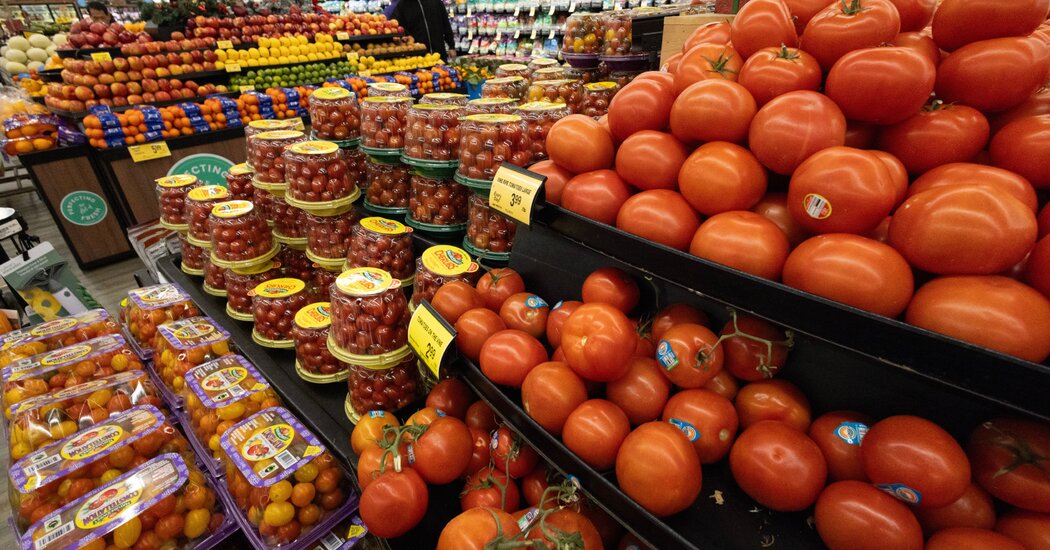Grocery consumers will in all probability really feel the impression of the brand new new Trump administration tariffs earlier than April is over. And the primary place they are going to really feel is in elements of the shop the place the stock ought to transfer shortly.
Within the manufacturing path, meals analysts mentioned on Thursday, anticipate small worth will increase in each day purchases comparable to bananas from Guatemala and grapes from Peru, international locations whose exports to america will trigger 10 % tariffs when new charges come into drive on Saturday. A separate circle of reciprocal tariffs for 57 international locations will comply with Wednesday.
The seafood counter could have much more surprises. Grocery shops promote many shrimp from Vietnam, which President Trump has hit at 46 % of reciprocal tariff, and India, with 26 reciprocal proportion of tariff.
Quickly, analysts say, they are saying that worth will increase will arrive for brackets like sugar and occasional, which is already priced at a historic peak. Particular espresso beans can ultimately value customers by 10 % to 35 % greater than earlier than tariffs, bean consumers have predicted.
From the pandemic grocery shops increase their strains of merchandise with non-public labels with a lower cost. Prospects beloved them as a method to navigate inflation, however tariffs would enhance prices.
“It was a bit refuge for customers,” says Keith Daniels, a managing accomplice on the Carl Marks Advisors Funding Financial institution, who focuses on meals and meals sectors. “It will not be there now.”
Nevertheless, he and a few meals leaders have mentioned that since a lot meals on cabinets in america is processed overseas or incorporates elements and packaging from a number of international locations, predicting how tariffs will change meals costs are troublesome, if not unimaginable.
A few of the value of tariffs will in all probability be absorbed and never transmitted to customers, as retailers reassess pricing methods and decide how lengthy the stock they have already got within the nation can proceed.
Nevertheless, the potential for elevating costs or different types of manipulation is excessive, mentioned Erol Schweizer, a veteran of the meals business that publishes The update of groceriesBulletin.
“Customers is not going to know if issues are proper at a worth or break,” he mentioned.
In any respect ranges of meals enterprise, to know that the extra paperwork will take time. Walmart requires suppliers to inform a previous worth enhance and clear documentation for them. However some companies haven’t but created techniques for recording and paying tariffs.
“It’ll take one 12 months to permit all these bills to unfold, however in 12 months you will note completely increased costs all through the board,” says Jeff Dunn, govt chairman of beneficiant manufacturers and Bolthouse Recent Meals.
Massive meals producers comparable to Mondelez and Kraft Heinz are higher geared up to soak up charges than smaller corporations with comparatively skinny working margins. For these smaller gamers, staying with the brand new tariffs will in all probability embody some quick, inventive and strategic value discount.
On Thursday, Paleovalley, an organization in Colorado, making meat sticks and different merchandise, was launched to melt the potential impression of tariffs on Monkfruit imported puree, an ingredient that’s troublesome for a supply.
Ethan Frisch is the co-founder and co-executive director of Burlap & Barrel who It imports spices from 30 international locations and buys solely from small producers. He has a cinnamon consignment that already involves a Vietnam ship. All farmers and the transport firm are paid. He has no concept if he should pay the tariff.
As a consequence of uncertainty like this, he determined to scale different items that the corporate plans to submit later in the course of the 12 months, comparable to Introduction Calendar, stuffed with samples of spices from world wide, saved in vacation packaging made in China.
Yun Hay, a specialist meals retailer in New York, buys instantly from rice farms, brewer for soy sauce and mills in Taiwan, then sends the products in bulk, delivering grocery shops and eating places nationwide. The brand new tariff for these meals, most of which should not have an area substitute, is 32 %.
“We’re on the primary line as a result of we’re an importer,” mentioned firm CEO Lisa Cheng Smith, whose most up-to-date supply of products entered Tuesday, only a day earlier than the tariffs are introduced. She plans to discover inventive methods to cut back different prices by 32 % with out shedding her enterprise.
“We is not going to panic and simply elevate our costs instantly,” she mentioned.
Within the meantime, it is probably not a nasty concept to fill up, mentioned Sam Silvertein, a Grocery Dive reporter at a business publication.
“It is tougher to fill up avocado than on soup packing containers,” he mentioned, “which is another excuse to take one thing on the shelf if provided at a very good worth.”
Tejal RAO has contributed to the reporting.

